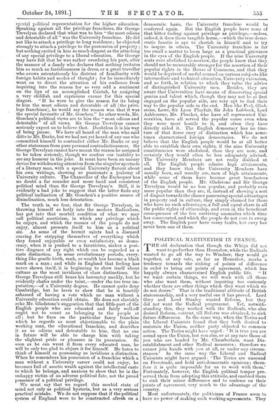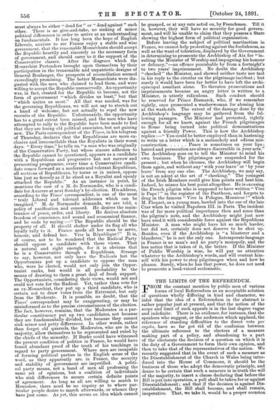POLITICAL MARTINETISM IN FRANCE. T HE old declaration that though the
Whigs did not want to go further than Hounslow, while the Radicals wanted to go all the way to Windsor, they would go together, at any rate, as far as Hounslow, marks a tendency towards the sinking of points' of difference in order to bring out points of agreement, which has happily always characterised English public life. " If we want certain, things, we will work with all those who also want them, without inquiring too curiously whether there are other things which they want which we do not desire." That is the traditional attitude of British statesmanship, and a very useful one it has proved. Lord Grey and Lord Stanley wanted Reform, but they did not want the Radical programme. Yet, notwith- standing this, they worked with the Radicals, who also desired Reform, content, till Reform was obtained, to sink future differences. In the same way, when the Tories and the Liberal Unionists found that they both desired to maintain the Union, neither party objected to common' action. The Tories might have urged : It is true you are sound upon the Union, but you also, or at any rate those of you who are headed by Mr. Chamberlain, want Dis- establishment and other Radical measures ; therefore we cannot join hands with you at all, or under any circum- stances.' In the same way the Liberal and Radical Unionists might have argued : The Tories are unsound on Free-trade, and hold anti-democratic opinions; there- fore it is quite impossible for us to work with them.' Fortunately, however, the English political temper pre- served them from adopting this attitude, and enabled them to sink their minor differences and to coalesce on their points of agreement, very much to the advantage of the country. Most unfortunately, the politicians of France seem to have no power of making such working agreements. They must always be either " dead for " or " dead against " each other. There is no give-and-take, no sinking of minor political differences in order to arrive at an understanding on fundamentals. It has long been the hope of English Liberals, anxious to see France enjoy a stable and wise government, that the reasonable Monarchists should accept the Republic heartily and sincerely as the necessary form of government, and should carry to it the support of the Conservative classes. After the disgrace which the Monarchist Pretenders brought upon themselves by their participation in the treasonable and unpatriotic designs of General Boulanger, the prospects of reconciliation seemed exceedingly promising. The better Monarchists were dis- gusted with the men who claimed to lead them, and were willing to accept the Republic unreservedly. An opportunity was, in fact, created for the Republic to become, not the form of government " which divides us least," but that " which unites us most." All that was needed, was for the governing Republicans, we will not say to stretch out a hand of welcome, but not actually to repel the new recruits of the Republic. Unfortunately, the opportunity has to a great extent been missed, and the men who have attempted to rally to the Republic have been made to feel that they are losing old political associates, but not gaining new. The Paris correspondent of the Times, in his telegram of Thursday, declares that the Republicans are more ex- clusive and irreconcilable than the Royalists in their worst days. " Every time," he tells us, " a man who was originally of the Conservative Party, but whose sincere adhesion to the Republic cannot be questioned, appears as a candidate with a Republican and progressive but not narrow and persecuting programme, every time a Conservative candi- date comes forward as a moderate and tolerant Republican, all sections of Republicans, by turns or in unison, oppose him just as fiercely as if he stood as a Royalist and openly attacked the Republic." As an instance in point, he mentions the case of a M. de Normandie, who is a, candi- date for Auxerre at next Sunday's by-election. His address, according to the Times' correspondent, is one of the most " truly Liberal and tolerant addresses which can be imagined." M. de Normandie demands, we are told, a policy of pacification and concord. He desires the main- tenance of peace, order, and liberty. He desires absolute freedom of conscience, and sound and economical finance, and he ends by saying :—" The Republic should' be the property of all. It should shelter under its flag all who loyally rally to it. France needs all her sons to serve, honour, and defend her. Vive In R6publique !" It is, of course, not to be wondered that the Radical Party should oppose a candidate with these views. That is natural and right enough, for it is obvious that he is a Conservative though a Republican. Strange to say, however, not only have the Radicals but the Opportunists put up a candidate to oppose the man who, were he elected, would not only join the Oppor- tunist ranks, but would in all probability be the means of drawing to them a great deal of fresh support. The Opportunists, considering their views, would not and could not vote for the Radical. Yet, rather than vote for an ex-Monarchist, they put up a third candidate, who is certain not to draw votes from the Extremist, but only from the Moderate. It is possible, no doubt, that the Times' correspondent may be exaggerating, or may be misinformed as to the precise circumstances of the election. The fact, however, remains, that the Moderates in a par- ticular constituency put up two candidates, not because they are fundamentally divided, but because they cannot sink minor and petty differences. In other words, rather than forget old quarrels, the Moderates, who are in the majority, allow themselves to be represented and ruled by the chiefs of the minority. If Burke could have witnessed the present condition of politics in France, he would have found abundant proof of the truth of his teachings in regard to party government. Where men are incapable of forming political parties in the English sense of the word, as they apparently are. in France, the security and stability of government are imperilled. A politi- cal party means, not a band of men all professing the same set of opinions, but a coalition of individuals who sink differences to secure certain definite points of agreement. As long as all are willing to march to Hounslow, there need be no inquiry as to where par- ticular people desire to march afterwards, or whence they have just come. As yet, this seems an idea which cannot be grasped, or at any rate acted on, by Frenchmen. Till it is, however, they will have no security for good govern- ment, and will be unable to claim that they possess a Statg showing the highest form of political organisation. Before leaving the subject of political martinetism in France, we cannot help protesting against the foolishness, as well as the want of toleration, displayed by the Government in determining to prosecute the Archbishop of Aix for " in- sulting the Minister of Worship and impugning his honour or delicacy,"—an offence punishable by from a fortnight's to two years' imprisonment. No doubt the Archbishop " cheeked" the Minister, and showed neither taste nor tact in his reply to the circular on the pilgrimage incident ; but surely it would have been far better to have left the archi- episcopal assailant alone. To threaten prosecutions and imprisonments because an angry letter is written to a Minister, is utterly ridiculous. Such conduct should be reserved for Prince Bismarck, who, if we remember rightly, once prosecuted a washerwoman for abusing' him at the wash-tub. The extent of the damage done by the Archbishop's language may be gathered from the fol- lowing passages. The Minister had protested, rightly enough for all we know, against the French pilgrimages to Rome being turned into political demonstrations against a friendly Power. This is how the Archbishop replies :—" You could be better employed than in hastening to write us a letter which is a melancholy and odious mis- construction Peace is sometimes on your lips ; hatred and persecution are always discernible in your acts." The Archbishop goes on to tell the Minister to mind his own business. The pilgrimages are suspended for the present ; but when he chooses, the Archbishop will begin them again, and without any with your leave' or by your leave' from any one else. The Archbishop, we may say, is not an adept at the art of " cheeking." The youngest of the Irish Members could give him points and beat him. Indeed, he misses his best point altogether. He is excusing the French pilgrim who is supposed to have written " Vive le Pape " in the register of the Pantheon, and forgets to drag in the famous " Vive la Pologne, Monsieur !" which M. Floquet, as a young man, bawled into the ear of the late Czar when he visited Napoleon III. in Paris. The incident was of far more political importance then and since than the pilgrim's note, and the Archbishop might just now have used it with considerable force against the Republican Minister. A man who might have hit so much harder, but did not, certainly does not deserve to be shut up. Besides, even if the Archbishop is " a blusterer and a blunderer," he is not the only one. Intemperate language in France is no man's and no party's monopoly, and the less notice that is taken of it, the better. If the Minister of Public Worship is wise, he will pay no attention whatever to the Archbishop's words, and will content him- self with his power to stop pilgrimages when and how he pleases. Surely, when he has that power, he does not need. to prosecute a loud-voiced ecclesiastic.



































 Previous page
Previous page